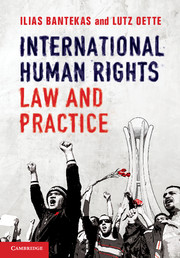Book contents
- Frontmatter
- Contents
- List of abbreviations
- Table of Cases
- Introduction
- 1 International human rights law and notions of human rights: foundations, achievements and challenges
- 2 International human rights law: the normative framework
- 3 Human rights in practice
- 4 The United Nations Charter system
- 5 The UN human rights treaty system
- 6 Regional human rights treaty systems
- 7 Individual complaints procedures
- 8 Civil and political rights
- 9 Economic, social and cultural rights
- 10 Group rights: self-determination, minorities and indigenous peoples
- 11 The human rights of women
- 12 The right to development, poverty and related rights
- 13 Victims’ rights and reparation
- 14 The application of human rights in armed conflict and the international criminalisation process
- 15 Human rights and counter-terrorism
- 16 Non-state actors and human rights
- 17 Globalisation and its impact on human rights
- Index
- References
1 - International human rights law and notions of human rights: foundations, achievements and challenges
- Frontmatter
- Contents
- List of abbreviations
- Table of Cases
- Introduction
- 1 International human rights law and notions of human rights: foundations, achievements and challenges
- 2 International human rights law: the normative framework
- 3 Human rights in practice
- 4 The United Nations Charter system
- 5 The UN human rights treaty system
- 6 Regional human rights treaty systems
- 7 Individual complaints procedures
- 8 Civil and political rights
- 9 Economic, social and cultural rights
- 10 Group rights: self-determination, minorities and indigenous peoples
- 11 The human rights of women
- 12 The right to development, poverty and related rights
- 13 Victims’ rights and reparation
- 14 The application of human rights in armed conflict and the international criminalisation process
- 15 Human rights and counter-terrorism
- 16 Non-state actors and human rights
- 17 Globalisation and its impact on human rights
- Index
- References
Summary
Introduction
The term human rights is frequently used as if it were self-explanatory. It is tempting and not uncommon to view ‘human rights’ as something intrinsically good. Human rights are often labelled (somewhat mockingly) as the new religion, a label which illustrates the elevated status they appear to enjoy. On closer inspection, it becomes evident that the term human rights is used freely and sometimes loosely by members of different disciplines and the public at large, meaning different things – both positive and negative – to different people depending on the context and the purpose for which it is used. It is therefore important to clarify the meaning(s) of the term by tracing its genealogy and examining its use in various contexts.
This undertaking cannot be confined to charting the development of international human rights law. Equating human rights with rights recognised in international treaties and/or other legal sources may in practice suffice when addressing particular human rights issues. Beyond this, it amounts to taking a purely positivist position that provides little guidance in response to a crucial question. Can a claim that something be recognised as a human right, for example the right to same-sex marriage, be justified, even if it is currently not explicitly recognised in law?
- Type
- Chapter
- Information
- International Human Rights Law and Practice , pp. 9 - 49Publisher: Cambridge University PressPrint publication year: 2013



